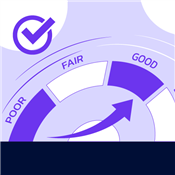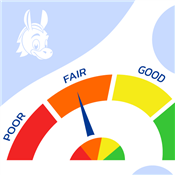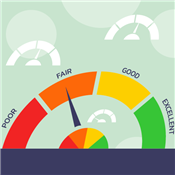How to Remove Collections from Credit Report
Don't let collections put a negative impact on your credit. Here are the best ways to remove collection items and improve your credit.
 |
Collection accounts can be tough to remove. They can put a dent in your credit report for years.
Even worse: Collection agencies may take legal action against you. You may be in more trouble if your debt collectors choose to file a lawsuit, putting even more damage on your credit.
Deal with your collections and prevent more damage to your credit. Learn the best ways to remove collections from your credit report.
What Is A Collection Account?
A collection is an account from a debit buyer or collection agency. It happens when you've fallen behind on your payments and become delinquent in paying your debt, reflecting as a collection account in your credit report.
Instead of your original lender trying to collect your debt, they sell it to buyers who will collect what you owe or hire an agency to recover your unpaid balance on their behalf.
The collection agency will be the one contacting you to settle your unpaid balance. These debt collectors may call you on your phone, send a written notice, or even call your family.
Debt Relief: Imagine Living Life Without Debt
- Get a free savings estimate today
- See how quickly you can be debt free
- No upfront fees and no obligation
How To Remove Collection Accounts
Collection accounts can stay on your credit for years, seriously dragging your credit score. It's not an easy situation to be in, but it's not impossible to get yourself out of it.
Here are some ways you can try to remove collection accounts from your credit report:
Generally, lenders take 180 days from your last unpaid due date before turning over your debt to third parties. They sell it to a debt collection agency that will do their best to gain some profit on your debt.
Dispute Inaccurate Collection Accounts
Collection accounts are items that have been passed from one party to another. It's not unusual for credit reports to contain inconsistent and incorrect details, like the wrong creditor or debt collection agency is listed or the same debt is reported repeatedly.
Worst-case scenario: Another person's collection becomes listed in your credit because your name is common or the debt is more than 7 years old and should already disappear from your credit reports.
You can view your credit reports for free in AnnualCreditReport.com, review your collection accounts, and check for the following details:
- Your name and mailing information
- Original lender and their address
- Debt collectors and their mailing information
- Account information like account number and debts owed
- Itemized list of debt with interest, charges, payments, etc.
- Current amounts you owe
- Transaction dates of your debt
- Contact information of collector for concerns and disputes
If you do find a collection account that isn't yours, file a dispute with the credit bureaus. The credit bureaus are required to investigate this collection account. If there is no supporting evidence that it's your debt, they need to remove it.
Equifax
- Dispute Form Link: Equifax Form
- Address:[1] Equifax Information Services, LLC
P.O. Box 740256, Atlanta, GA 30374-0256
Experian
- Dispute Form Link: Experian Form
- Address:[2] Experian
P.O. Box 4500, Allen, TX 75013
TransUnion
- Dispute Form Link: TransUnion Form
- Address:[3] TransUnion Consumer Solutions
P.O. Box 2000, Chester, PA 19016-2000
When to file a dispute:
Disputing works best if you've verified that the debt isn't yours. Once you know for sure that you have a listed debt that you don't own, you have every right to dispute it. After all, you're the one bearing the impact of somebody else's unpaid debt.
Validate Debts With Collection Agency
If your collections are accurate, sometimes debt collectors may attempt to collect the rest of your unpaid debts without proof or giving you a heads-up. If there are no errors, the next step is to validate your collection accounts with the debt collection agencies.
Often, your debt will be passed around from one agency to another, and there may be details you don't know are errors or mistakes. Write a debt validation letter to your debt collection agency and request information about the debt, such as:
- Information on the original creditors
- Account information and outstanding balances
- Original due dates and date of delinquencies
- Paperworks and the original contract
- Debt collection agency's authority to collect the debt
If the debt collection agency validates and confirms that the debt is yours, you can decide how to dispute it—like writing a pay-for-delete or a goodwill letter.
Don't spare any effort to verify and check off your financial transactions. This is especially true if you have a couple of old debts. You want to make sure that transactions reported to credit bureaus are yours or aren't outdated.
Request A Goodwill Deletion
A goodwill deletion is a letter requesting the removal of the collection item from your credit reports. You'll reach out to the collection agency or original lender to forgive you for unpaid debts.
Though there is no guarantee the goodwill request will result in removal, there's no harm in trying. Some collection agencies or lenders will remove it as a courtesy or an act of forgiveness.
Don't forget to put any goodwill arrangement in writing as proof of the agreement between you and the collection agency.
[Date]
[Creditor]
[Creditor's Address]
Re: [Account number]
Dear [Creditor],
Thank you for taking the time to read my letter and considering my goodwill request.
I recently reviewed my credit reports and discovered that I have [late payment/missed payment] reported on [date item was reported] from my [name of account]. I humbly ask you to remove it.
I've had a great experience with [creditor] since [year account was opened]. Before my [late payment/missed payment], I had an excellent track record of paying my dues on time. I know that I need to make timely payments on my [name of account], and I will stay on top of my payments moving forward.
I made a [late payment/missed payment] because of [situation of your financial hardship or unexpected change in circumstance resulting into a late payment/missed payment]. This won't happen again.
I've taken some steps to address my current situation. These are some things I did to ensure that I won't get [late payment/missed payment] again:
[List down things you did to improve your credit reports]
I'm hoping to [state what you will do: apply for a loan/credit card, refinance mortgage, consolidate other debts, etc]. My recent negative marks may disqualify me. I am committed to paying back what I owe, and I would be incredibly grateful for any goodwill adjustment for my [late payments/missed payments] on [date item was reported].
I'm hoping for your understanding and consideration.
Kind regards,
[Your name]
[Your address]
When to request a goodwill deletion:
Essentially, goodwill deletions work best if you've already paid your debt to the collection agency. You are asking for forgiveness from your debt collectors to write off the account since you've settled it.
Collection accounts stay on your credit report for up to seven years from the time of the last payment. Even if you've paid your debt, the collection account can stay on your credit report for years.
Send A Pay-For-Delete Letter
A pay-for-delete letter works the same way as a goodwill deletion. The only difference is with a pay-for-delete letter, you are negotiating with the collection agency.
Always remember that the debt collection agency bought your debt from the original lenders. Their goal is to gain some money from that purchase. This only happens when you pay off your debts. You can negotiate that you'll pay the full debt or a portion in exchange for removing the collection account.
Do this with caution so you're sure the collection agency will keep their end of the bargain. One key practice is to document your agreement and place everything in writing. This means saving emails, handwritten letters, and any tangible evidence that both agree to the arrangement.
When to use a pay-for-delete letter:
Use a pay-for-delete letter if you can truly pay the debt and want to negotiate your collection account. You can try to settle for less than what you originally owed.
Note your debt collector isn't required to remove your collection action even if you've settled your debt. In reality, your late payments and overdue balances are still your financial transactions. You turned delinquent on your debts, and collection agencies need to report it.
Hire Credit Repair Companies
Many credit repair companies offer in-depth creditor intervention on top of credit repair services. You'll be employing the help of trained counselors, credit lawyers, or credit specialists to handle your collection accounts for you.
These are some of the best credit repair companies that can help you handle collection accounts in your credit reports:
- Lexington Law offers Focus Tracks in case of unexpected life events, like divorce or medical bills, that result in debts and collection accounts
- Credit Saint provides a 90-day money-back guarantee so that you can request refunds in case they can't remove any negative item, such as your collection accounts, within 90 days
- Sky Blue Credit specializes in mortgage preparation and can dispute items, like collections, to help prepare you to qualify for home loans or refinancing
When to hire a credit repair company:
Hire a credit repair company when you don't have the time to address collections. These companies know the most aggressive approach for handling debt collectors and credit bureaus. They have years of experience negotiating on behalf of their clients.
Free Online Credit Assessment
- Free Credit Score
- Free Credit Report Summary
- Free Credit Recommendation
- 5 Minutes to Check Your Credit
Get Started on Your Credit Repair
- No charges for the first 6 days
- 90-day guarantee
- 45-day dispute cycle
- Cancel service anytime
Wait For Collection Account To Disappear
Collections have a time limit for how long they can stay on your credit report. Usually, they'll be on your credit report for up to seven years from the time of delinquency.[4] After that, the collection account is removed whether or not it was paid off.
The time frame can feel overwhelming. Seven years can feel long; however, over time, the collection account will have less impact on your score. The more positive credit transactions you have, the more it can impact your credit for the better.
When to wait for the collection account to disappear:
After you've tried all other options without success, you can wait for the item to drop off your credit. Collection accounts usually disappear seven years after the date of delinquency.
You don't need to wait seven years doing nothing until the collection account drops off — especially if you can't afford to pay the balance yet. You can slowly build better credit by doing the following:
- Paying other bills on time
- Maintaining a low credit utilization
- Subscribing to credit builder apps
- Opening new credit lines you will use minimally
Apply for a Credit Builder Account at Self
- Get the Credit Builder Account that helps build credit today!
- Choose the plan that fits within your budget
- Monthly payments are reported to the three major credit bureaus.
How Collections Affect Your Credit
A collection account can impact your credit for a long time. Here are some things that may happen once they hit your credit report:
- Drop in credit score
A collection account is a derogatory item. It doesn't matter if it's inaccurate or if you truly own the debt. It's crucial to address it immediately so you can avoid the impact of unpaid debt.The newer the account is, the more likely you will experience a sudden drop in your credit score. Over time, the severity of the collection account lessens, but you will still have unpaid debt. - Difficulty in applying for future credit
Collection accounts are a huge sign that you struggle to pay off your debts. That's why you need to address the collection accounts first, especially if you plan to apply for a mortgage or new credit cards.For FICO credit score models, 35% of your score assesses payment history, i.e., paying off your loans on time.[5] Collection accounts signify your inability to pay debts on time. This can look unattractive to lenders and banks.
- Legal action from collectors
The collection agency can sue you for not paying the debt. Unpaid debts have statutes of limitations (SOL), which is the amount of time debt collectors have to take legal action against you for the debt.SOL is different from the number of years the collection account can stay on your credit report.Each state has a different SOL for collection accounts. More importantly, even if the collection account disappears from your credit report, debt collectors can still file lawsuits against you if SOL permits.
How do collection agencies work?
Collection agencies are middlemen for original creditors. They recover debts that are past the due date by contacting customers. Then, they return the amount to the original creditors.
Alternatively, collection agencies can buy debts at a fraction of the price from the original creditors. However, they are responsible for collecting the amount you owe.
You can try negotiating with collection agencies for a debt settlement that isn't the original amount you owed.
Can Removing Collections Fix Your Credit?
Not always. Payment history is the biggest factor that affects your credit score and missed payments seriously deter that factor. Collections can drop your credit score by more than a hundred points.
Other transactions, loans, or activities can also affect your overall credit. Collections are just a portion of your credit report. You may have other negative items that prevent you from repairing your credit.
If you want to ensure that removing collections will guarantee improvements, improve your overall financial habits. You can do this by paying on time, adding other credit lines that you will use minimally, and aging your accounts.
Tips For Dealing With Collection Accounts
Collection accounts can become the reason you can't apply for new loans. Here are some good practices you can apply in dealing with collection accounts:
- Verify information in your credit report
Be meticulous in monitoring your credit. This can save you a lot of money and fluctuations in your credit score. It pays to keep close attention to your financial transactions because identity fraud and erroneous information are rampant.[7]There are reputable credit monitoring services and credit repair apps you can use to track your credit. Review your items in the credit report from time to time to avoid negative items that aren't yours to begin with. - Know your Statute of Limitations (SOL)
Let's say you pass the time that a collection stays on your credit report. Some agencies can still go after you. On the other hand, if you pass the statute, you're no longer under any legal obligation to pay your debts. - Know your rights as a consumer
The Fair Debt Collection Practices Act (FDCPA) strictly establishes guidelines on what debt collectors can and can't do. Debt collectors shouldn't use illegal, abusive, unfair, and deceptive practices to force you to pay off your dues.Never forget: You have rights as a consumer, even if you are struggling to pay off unsettled debts.
Free Online Credit Assessment
- Free Credit Score
- Free Credit Report Summary
- Free Credit Recommendation
- 5 Minutes to Check Your Credit
Get Started on Your Credit Repair
- No charges for the first 6 days
- 90-day guarantee
- 45-day dispute cycle
- Cancel service anytime
BOTTOM LINE
Removing collections from your credit report may be tough, but it's not impossible. You can try various options, get the help of credit professionals, or wait for time to heal your credit. Collection accounts won't stay on your credit report forever.
References
- ^ Equifax. File a Dispute on Your Equifax Credit Report, Retrieved 05/23/2024
- ^ Experian. Instructions for Disputing by Mail, Retrieved 05/23/2024
- ^ TransUnion. Dispute your credit report by mail or phone, Retrieved 05/23/2024
- ^ CFPB. How long does negative information remain on my credit report?, Retrieved 05/23/2024
- ^ myFICO. What's in my FICO® Scores?, Retrieved 05/23/2024
- ^ FTC. Fair Debt Collection Practices Act, Retrieved 05/23/2024
- ^ CFPB. What are common credit report errors that I should look for on my credit report?, Retrieved 05/23/2024
- ^ CFPB. Can debt collectors collect a debt that's several years old?, Retrieved 05/23/2024
- ^ Nolo. Statutes of Limitations for All 50 States (and the District of Columbia), Retrieved 05/23/2024
Write to Alex Mambaje at feedback@creditdonkey.com. Follow us on Twitter and Facebook for our latest posts.
Note: This website is made possible through financial relationships with some of the products and services mentioned on this site. We may receive compensation if you shop through links in our content. You do not have to use our links, but you help support CreditDonkey if you do.
Read Next:










